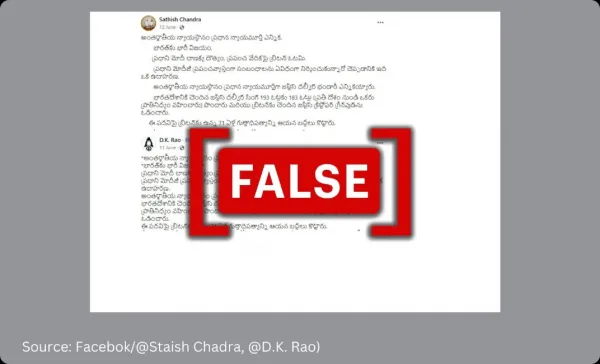By: Rohith Gutta
July 20 2023
 ICJ_CJI
ICJ_CJI
Justice Bhandari is one of the 15 member judges at the International Court of Justice. There is no position for a “Chief Justice” at the court.
Context
A claim is circulating on social media platforms that Justice Dalveer Bhandari from India was elected as the “Chief Justice” of the International Court of Justice —the principal judicial organ of the United Nations (UN). Facebook posts, mainly in Telugu, sharing the claim further assert that Justice Bhandari defeated Christopher Greenwood of Britain to become the ICJ “Chief Justice,” thus breaking Britain's monopoly over that post for the last 71 years. The posts also claim that of 193 votes in the General Assembly, presumably of the UN, Bhandari availed 183, and all 15 of the Security Council votes. The posts go on to say that Bhandari’s elevation as the “Chief Justice” showcases that the Indian government, through its Ministry of External Affairs, has been working for the past six months for this victory and that it also showcases the efforts of Indian Prime Minister Narendra Modi. Posts making similar claims have been circulating for a couple of years. Archived versions of posts can be seen here and here.
However, these posts are riddled with multiple factual errors. There is neither a position called “Chief Justice” at the ICJ, nor was Justice Dalveer Bhandari elected as one.
In Fact
The election of judges to the ICJ is governed by the “Statute of the International Court of Justice.” Article 3 of the statute states, “The Court shall consist of fifteen Members, no two of whom may be nationals of the same State.” According to Article 4 of the statute, members of the United Nations’ General Assembly and Security Council — both permanent and non-permanent — elect the judges “nominated by the national groups in the Permanent Court of Arbitration.”
In line with the statute, the ICJ currently has 15 members, and Justice Dalveer Bhandari is one such member. The ICJ statute makes no mention of a “Chief Justice” and the court only has a President, Vice President apart from other members. Joan E Donoghue from the U.S. is the current President of the ICJ, while Kirill Gevorgian from the Russian Federation is its Vice-President.
According to a report published by The Hindu on November 25, 2017, Justice Dalveer Bhandari, who had served as the Chief Justice of the Bombay High Court and a judge at the Supreme Court of India, was first elected to the ICJ in 2012 — for the remainder term of a judge who quit prematurely — after winning over his Philippines contender. Justice Bhandari received 122 votes in the General Assembly (180 out of 193 member states had cast their ballots) and 13 out of 15 in the Security Council.
Another report by The Indian Express published on January 9, 2022, noted that Justice Bhandari was re-elected as a member of the ICJ in November 2017 after his contender Christopher Greenwood from the U.K., withdrew his nomination. According to a report by the Hindustan Times, after Greenwood withdrew from the race, Justice Bhandari received 183 out of 193 votes in the General Assembly and all 15 votes in the Security Council,
According to the ICJ statute, members of the court are elected for nine years and may be re-elected, while the court’s President and Vice-President are elected for three years and can also be elected again.
The Verdict
Justice Dalveer Bhandari is one of the 15 judges of the International Court of Justice (ICJ) and not its “Chief Justice.” The ICJ has a President and no “Chief Justice.” Therefore, we mark the claim false.